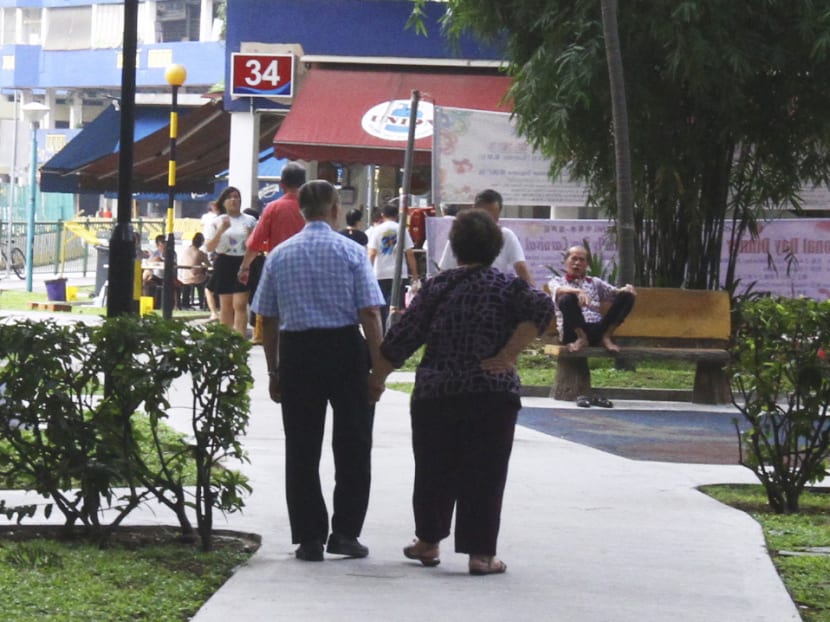S'poreans looking to assisted living for old age: Survey
SINGAPORE — A survey by the Lien Foundation and insurer NTUC Income with close to 1,000 respondents has found that nearly 50 per cent of them are willing to stay in assisted living facilities, and would fork out between S$1,386 to S$1,745 a month to live in them.
SINGAPORE — A survey by the Lien Foundation and insurer NTUC Income with close to 1,000 respondents has found that nearly 50 per cent of them are willing to stay in assisted living facilities, and would fork out between S$1,386 to S$1,745 a month to live in them.
Assisted living facilities are more “home-like” facilities that offer some degree of support with daily living activities such as bathing, unlike nursing homes geared towards those who need more intensive medical and nursing care.
Lien Foundation, together with Khoo Chwee Neo Foundation, have been urging more support for building such facilities in Singapore, calling the current model of nursing homes in Singapore “safe but soulless” in a report released earlier this month.
The survey was conducted from late July to August among 998 respondents aged between 30 and 75 years old.
Although almost eight in 10 Singaporeans prefer to grow old in their homes — either independently or with their spouses — the survey also found support for other alternative living arrangements such as retirement villages or apartments geared to seniors.
Over six in 10 of younger respondents aged 30 to 44 years old were willing to stay in a retirement village or a senior’s apartment, as did a similar proportion of those aged 60 to 75 years old.
Qualities valued in aged care services revolved around having well-trained healthcare professionals, well-maintained and clean facilities, as well as having regular activities and therapy sessions.
Privacy was also highly valued, with 90 per cent of respondents willing to stay in assisted-living facilities preferring single or twin-bedded rooms, while close to half of the respondents felt it was unacceptable to stay in six to eight-bedded rooms for the rest of their lives.
In the area of financial planning for aged care, majority of the respondents were not aware of how much it would cost, and many not were confident of being able to afford aged care services. Those aged 30 to 44 were the most aware of the cost required (32 per cent), while the seniors were the least aware (22 per cent).
Mr Gabriel Lim, programme manager of Lien Foundation, speaking at a media briefing on the survey findings on Tuesday (Oct 18), said that despite growing “receptiveness” towards such alternatives, there is still a lack of choices, or “reference models” locally.
“The study affirms how people want more choices and explore options … (especially) for the younger age group, versus the older ones who are contented with what’s in the market right now.
“So, it’s important to rethink, and (for developers) to see how they can cater to the changing demographics (and wants),” he said.
In response to the earlier report, the Ministry of Health said it was launching a call for proposals to develop and research solutions for future nursing homes with the Urban Redevelopment Authority.
It agreed there was a need for a more diverse range of aged care services, and that it will study the suggestions on assisted living services.
Dr Belinda Wee, 52, co-founder of assisted living facility St Bernadette Lifestyle Village, felt that given the limited space and specialised care services, the expectations of paying S$1,745 for was “not as realistic”.
The facility charges about S$3,650 a month, which covers accommodation, utilities, medical care, physiotherapy and social activities.
Another possibility with greater economies of scale would be group living arrangements, such as a Housing and Development Board (HDB) flat that is senior-owned and subletted to three or four seniors, with a professionally trained domestic helper on-site.
The main obstacle, she added, remains in getting policy-makers on board. “There’s got to be a lot of policy, mindset change first, in allowing seniors to sublet their flats, of allowing many seniors to hire one helper… I hope that things can move in that direction, and for policy makers to see the benefit of it,” she said.
At the event, NTUC Income also launched a new insurance plan which provides pay-outs that covers senior diseases such as Parkinson’s disease, dementia or Alzheimer’s disease, blindness, major head trauma, for instance. It will be available on Oct 28.







